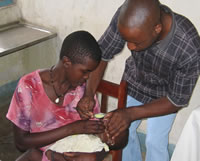|
|
|||||
|
|
Partnerships Key to Success of PMI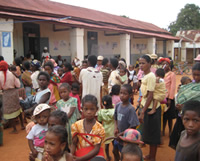
PMI partnered with the Global Fund, Canadian Red Cross, American Red Cross, UNICEF, WHO, Ministry of Health and others on an integrated health campaign in Madagascar. Above, in Dabolava, children under 5 years receive for free a measles vaccine, mebendazole to treat worm infections, vitamin A, and a LLIN to prevent malaria. Credit: Julie Thwing, CDC PMI is an interagency initiative led by the U.S. Agency for International Development (USAID) and implemented together with CDC. It is overseen by a PMI Coordinator and an Interagency Steering Group made up of representatives of USAID, CDC/HHS, Department of State, Department of Defense, National Security Council, and Office of Management and Budget. In addition, PMI works with several other national and international partners, including the Roll Back Malaria Partnership; the Global Fund to Fight AIDS, Tuberculosis and Malaria; the World Bank Malaria Booster Program; UNICEF; World Health Organization’s Global Malaria Program; and nongovernmental organizations (NGOs), including faith-based and community groups, academia, and the private sector. PMI continues to expand its partnerships with the NGOs, faith-based organizations, and the private sector. PMI works in close partnership with host country governments in Africa and builds on existing national strategies, plans, and programs to achieve PMI’s goal. PMI’s $1.2 billion investment over 5 years complements other donors’ investments. PMI Target Countries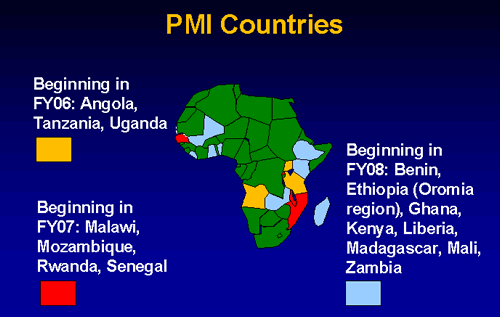 PMI is now at work in 15 target countries:
PMI InterventionsPMI’s goal is to provide 85% of those especially vulnerable to malaria—pregnant women and children under 5 years—with the treatment and prevention interventions they need:
PMI’s Reach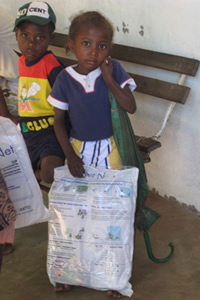
This little girl received a free LLIN through the integrated campaign in Madagascar. Credit: Julie Thwing, CDC As of January 2008, more than 30 million people in Africa have benefited from PMI interventions.
Impact of Malaria Control EffortsPMI has already reached millions of people with lifesaving services, and there is evidence that the scaled-up interventions made possible by the investments of PMI and its partners in support of the Ministries of Health are having an impact in several countries. 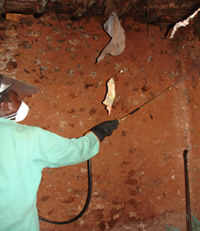
This sprayer covers the interior walls of a typical home in Zanzibar with ICON insecticide to kill mosquitoes that rest on the walls as part of an IRS program to reduce malaria transmission. Credit: Bob Wirtz, CDC For example, during the past two years, Zanzibar’s Malaria Control Program, PMI, the Global Fund, and other partners supported a rapid scale-up of ITNs, IRS, and ACTs on the islands of Zanzibar, part of the United Republic of Tanzania.
How Do CDC's Malaria and Entomology Branches Contribute to PMI?As a public health agency with wide experience in malaria prevention and control, CDC brings to PMI strong and varied technical expertise that complements the contributions of other PMI partners. Specialists in these branches:

An Ethiopian girl stands behind the ITN that she will sleep under in the evening. Credit: Steve Smith, CDC For more information on PMI, see PMI’s Web page and CDC’s PMI page. Page last modified : April 3, 2008 Content source: Division of Parasitic Diseases National Center for Zoonotic, Vector-Borne, and Enteric Diseases (ZVED)
|
|
|||||||||||||||||||||||||||
| Home | Policies and Regulations | Disclaimer | e-Government | FOIA | Contact Us | ||||||
|

